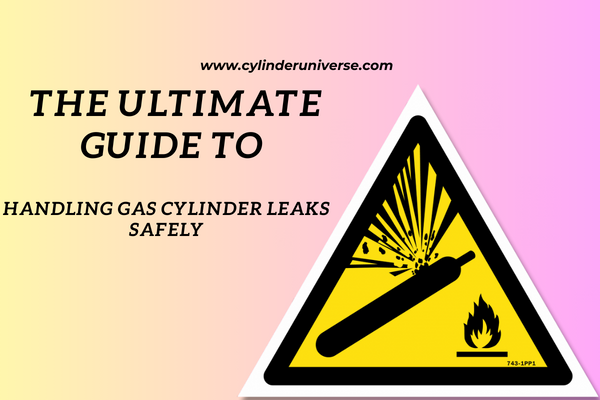The Ultimate Guide to Handling Gas Cylinder Leaks Safely
Gas cylinder leaks can be a cause for concern, but with the right knowledge and precautions, you can ensure safety for yourself and those around you. In this comprehensive guide, we will explore the ins and outs of handling gas cylinder leaks safely. From understanding the signs to taking immediate actions, let’s dive into the essential information that every member of the general public should know.

Table of Contents
Introduction
Gas cylinder leaks are a potential hazard that demands awareness and preparedness. But fear not, as we embark on this journey to equip you with the knowledge and skills to handle gas cylinder leaks safely. Let’s unravel the mystery behind gas cylinder leaks and empower you to take control.
Recognizing Signs of a Leak
Gas leaks often come with telltale signs. If you notice a hissing sound, a distinct odor, or a sudden drop in pressure, there might be a leak. Pay attention to these signs, as early detection is crucial for handling gas cylinder leaks safely.
Immediate Actions to Take
In the event of a gas cylinder leak, swift action is paramount. Shut off the gas source if possible and ventilate the area. Avoid flames, sparks, or any potential ignition sources. Your quick response can make a significant difference in preventing a hazardous situation.
Safety Measures for Bystanders
Everyone in the vicinity is potentially affected by a gas leak.Guide bystanders to a safe distance and inform them of the situation. Creating a secure perimeter ensures the safety of all involved.
Proper Ventilation Techniques
Ventilating the area is a key step in managing a gas leak.Open windows and doors to allow fresh air in and facilitate the dissipation of the gas. Adequate ventilation is crucial for minimizing risks.
Utilizing Safety Equipment
Protective gear can be your shield in a gas leak scenario.Use safety goggles, gloves, and a mask to shield yourself from harmful substances. Having the right equipment adds an extra layer of safety.
Contacting Emergency Services
When in doubt, call for help. Reach out to emergency services immediately. Provide them with accurate information about the situation, including the type of gas and its quantity. Their expertise is invaluable in handling gas cylinder leaks safely.
Securing the Area
Containment is key in preventing the spread of a gas leak.Identify the source and, if possible, seal it. Mark the area clearly to prevent accidental entry, reducing the risk of further complications.
Preventing Future Leaks
Learning from the experience helps prevent future incidents.Regular maintenance and proper handling of gas cylinders are essential. Educate yourself on the dos and don’ts to minimize the risk of leaks.
Common Mistakes to Avoid
Understanding pitfalls can save you from unnecessary risks.Avoid common mistakes like ignoring small leaks or attempting repairs without proper knowledge. Awareness of potential errors enhances your safety measures.
Understanding Gas Properties
Knowledge of gas properties is fundamental in handling leaks. Different gases pose varying risks, and understanding their properties empowers you to take informed actions when handling gas cylinder leaks safely.
Educational Outreach
Spread the knowledge to create a safer community.Educate your peers and community about gas cylinder safety. Awareness is the first line of defense against potential hazards.
Conclusion
In conclusion, being well-informed and prepared is the key to handling gas cylinder leaks safely. By recognizing signs, taking immediate actions, and implementing safety measures, you contribute to creating a secure environment for everyone.
FAQs on Gas Cylinder Leaks
What should I do if I smell gas near a cylinder?
Act immediately! Move away from the area and inform others. Call emergency services for assistance.
Can I use water to control a gas leak?
No, water may exacerbate certain gas leaks. It’s best to focus on ventilation and securing the area.
Is it safe to attempt fixing a minor gas leak on my own?
No, leave repairs to professionals. Handling gas leaks requires expertise to avoid accidents.
How often should I inspect my gas cylinders for potential leaks?
Regular checks are crucial. Conduct inspections at least once a month to ensure early detection of any issues.
Can gas leaks occur even with proper handling and maintenance?
Yes, but proper handling minimizes the risk. Regular maintenance and adherence to safety guidelines are essential.
Remember, knowledge is your best tool in ensuring safety. Stay informed, stay safe!